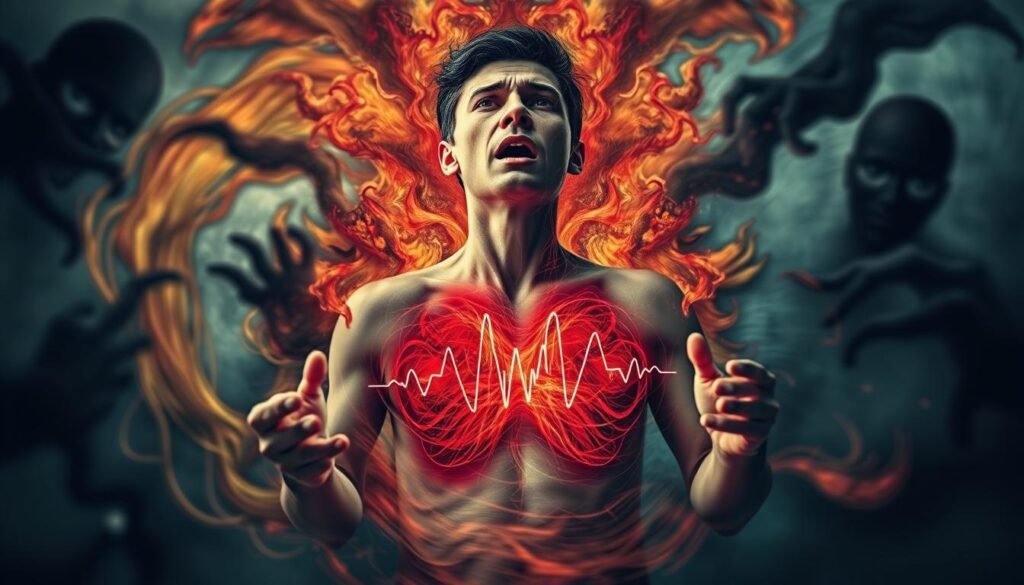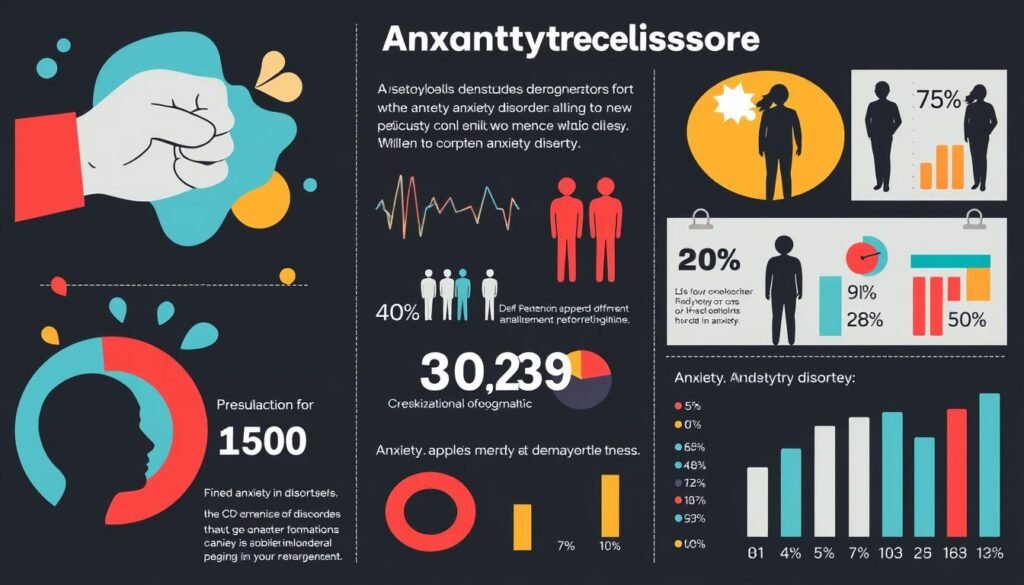Almost 5 percent of American adults will face a panic disorder at one time. This fact points to how common anxiety attacks are and why we should pay attention. Many wonder about the dangers of these attacks. We’ll look into if anxiety attacks can be deadly, what symptoms they bring, and how they affect health.
Key Takeaways
- Nearly 5% of adults experience panic disorder in their lifetimes.
- Panic attacks typically last less than 30 minutes, with an average duration of about 10 minutes.
- Common symptoms include sweating, chest pain, shortness of breath, and heart palpitations.
- Anecdotal evidence shows that those with panic disorder may face increased cardiovascular risks.
- Cognitive-behavioral therapy is a recognized treatment for panic disorder.
- It is important to seek medical attention if panic attack symptoms become frequent or severe.
Understanding Anxiety Attacks
Anxiety attacks can feel extremely scary. They are marked by intense fear and worry. You might ask, what is an anxiety attack? To understand them, it’s helpful to know their symptoms and why they happen. Knowing what leads to an anxiety attack can help manage them better.
Definition of an Anxiety Attack
Anxiety attacks come on quickly and feel very intense. People might feel extreme fear and physical symptoms during an attack. This happens because of the fight or flight response, which is how our bodies react to danger. Symptoms like a fast heartbeat and quick breathing are common.
The Body’s Reaction During an Anxiety Attack
When an anxiety attack happens, our bodies go through a lot of changes. This is due to stress hormones like adrenaline. Everyone experiences these symptoms differently. Some common physical reactions include:
- Increased heart rate
- Shortness of breath
- Trembling or shaking
- Chest pain
- Sweating
- Nausea or gastrointestinal distress
- Dizziness or feeling faint
It’s very important to understand anxiety attacks for managing them. Knowing about them can help you react properly during an episode. This might include getting professional help, using self-help strategies, or making lifestyle changes.
| Symptom | Description |
|---|---|
| Elevated Heart Rate | Rapid heartbeats that may feel like palpitations. |
| Breathing Difficulty | Feeling as if it is hard to breathe or choking. |
| Trembling | Shaking sensations in various body parts. |
| Nausea | Feelings of sickness or an unsettled stomach. |
| Dizziness | Light-headedness or feelings of disorientation. |
Panic Attack Symptoms
Panic attacks impact both mind and body deeply. Recognizing these signs is key to handling them. People might have different experiences, but some symptoms are quite common.
Common Symptoms Experienced
Those with panic attacks report various symptoms, such as:
- Racing heart or palpitations
- Chest pain or discomfort
- Shortness of breath or a feeling of choking
- Feeling dizzy, light-headed, or faint
- Chills or hot flashes
- Nausea or abdominal distress
- A sense of impending doom or fear of losing control
- Feelings of detachment from reality
About 11% of US adults deal with these symptoms yearly. It shows how important it is to understand them.
Duration and Intensity of Panic Attacks
Panic attacks vary in length. They can last from five minutes to an hour. The intensity can also vary, causing lasting distress.
Some deal with panic attacks monthly; others might have them weekly. Knowing more can help us manage them better.

Can an Anxiety Attack Kill You?
It’s important to know if anxiety attacks can be deadly. They feel very scary, but they usually don’t cause death. Research has shown that while anxiety attacks are intense, they don’t lead to death directly. However, people with anxiety and health issues, like heart problems, need to be careful.
Research Findings on Fatality Risks
Panic attacks aren’t typically deadly. But they can make you feel like you’re dying. Symptoms include shaking, chest pains, and feeling out of touch. Studies involving more than 30 million people found that anxiety can up the risk of death from various causes.
Heart Health Implications Related to Anxiety
Anxiety can hurt your heart, possibly causing high blood pressure and heart disease. This link between anxiety and heart health is crucial to understand. Stress hormones, like cortisol, can also lower your immune system. This makes you more prone to getting sick. People with anxiety need to manage it well to avoid these issues.

| Factor | Impact |
|---|---|
| Panic Attacks | Cause intense symptoms but not fatal |
| Chronic Anxiety | Strain on cardiovascular system |
| High Stress Hormones | Weaken immune response |
| Risk of Disease | Increased susceptibility to infections |
| Gastrointestinal Issues | Potential problems like IBS and ulcers |
Anxiety Disorders and Panic Attacks
Panic disorder is a major type of anxiety disorders. It involves repetitive panic attacks and a strong fear of having more. A large number of people are affected by it. This highlights the importance of finding effective treatments and management.
Panic Disorder Explained
Panic disorder shows up as sudden, intense fear. These are known as panic attacks. During these moments, one might have a fast heartbeat, trouble breathing, and feel very scared. This intense fear makes one worry about having another attack. This worry can upset someone’s life.
Statistics on Panic Disorder Prevalence
Studies show that up to 5% of U.S. adults may experience panic disorder. Anxiety disorders are common, and they can vary in how they affect people. For example, about 2.1% of those with anxiety disorders died over about a 9.7-year study. The mortality rate for those with anxiety disorders was 1.66 times higher than those without. This shows how important it is to get help early.

Finding treatment for panic disorder is key. Women, in particular, are about twice as likely as men to report having panic disorder.
| Statistic | Percentage |
|---|---|
| Lifetime prevalence of panic disorder in adults | 5% |
| Mortality rate for individuals with anxiety disorders | 2.1% |
| MRR for anxiety disorders compared to the general population | 1.66 |
| Women experiencing panic disorder versus men | Twice as likely |
Managing Anxiety Attacks
There are ways to handle anxiety attacks that include certain coping methods. People can control the impact of these episodes by knowing and using these techniques.
Techniques to Cope During an Attack
Using various coping methods is crucial when anxiety attacks hit. Activities that keep you grounded help you stay in the now. Noticing everything around you takes your mind off anxiety.
Breathing Exercises and Mindfulness Practices
Breathing right is key to easing anxiety. Inhale slowly through your nose then exhale through your mouth. This helps steady your breathing. Add mindfulness to better deal with anxiety by accepting your feelings.
Anxiety and Breathless Episodes
Anxiety attacks often come with feelings like being out of breath. It’s important to know how anxiety and fast breathing are connected. People might feel like they can’t catch their breath, which makes anxiety worse.
Understanding Hyperventilation
Hyperventilation makes you breathe quickly and shallowly. This leads to less carbon dioxide in your blood. Then, you might feel dizzy, have tingling feelings, and think something bad will happen. Feeling out of breath can be scary and makes you want to find a way to feel better.
The Importance of Controlled Breathing
Practicing controlled breathing can make you feel better. Slow, deep breaths balance carbon dioxide levels and help you calm down. It’s very helpful for people dealing with panic. Self-help tips offer ways to stay calm when you’re really anxious.
Anxiety Attack Prevention Strategies
To prevent anxiety attacks, recognize triggers and make lifestyle changes. Anxiety often strikes in stress or because of certain thoughts. Knowing these triggers helps stop attacks.
Identifying and Managing Triggers
Managing anxiety triggers can cut down on anxiety attacks. Common ones include:
- Work stress
- Personal relationship issues
- Traumatic events
- Using substances like caffeine and alcohol
Dealing with these can build better coping skills. Therapy offers great strategies for handling stress. Getting help is a smart move, and this guide has more coping tips.
Lifestyle Changes to Reduce Anxiety Risks
Making lifestyle changes for anxiety helps lessen attack frequency and severity. Helpful changes are:
- Exercising regularly to release endorphins and lower stress.
- Eating healthily to boost well-being.
- Getting consistent sleep for better rest.
- Doing mindfulness and relaxation exercises to stay calm.
- Reaching out to loved ones in hard times.
These steps not only prevent anxiety attacks but improve mental health too. Understanding and applying these with professional advice can balance your life. The link between life habits and less anxiety is key; learn more ways to manage anxiety here.
When to Seek Medical Attention
Knowing when to seek help for anxiety is key to well-being. Spotting signs of worsening anxiety leads to action. It’s the first step to get help quickly.
Signs Indicating the Need for Help
There are clear signs when professional help is needed for anxiety. You should get help if you experience:
- New or worse symptoms that affect your daily life.
- Frequent panic attacks that are hard to control.
- Overwhelming distress or anxiety feelings.
- Physical symptoms like chest pain or trouble breathing with no clear cause.
- Signs of depression or thoughts about hurting yourself.
Consulting Health Professionals for Treatment Options
Health professionals can offer personalized treatment plans. They might suggest therapy, medications, or lifestyle changes to help mental health. They’ll choose the best approach for you. Quick help can stop symptoms from getting worse and improve coping skills.
If you’re unsure about your condition, seeing a healthcare provider is a good step. It leads to better management and peace of mind. To understand more about anxiety and other conditions, look at this informative article.
Conclusion
Understanding anxiety and its effects is critical for people who have these scary episodes. Panic attacks feel intense and can seem like heart problems, but they usually aren’t deadly. Studies show that, over time, panic disorder may increase heart risks but doesn’t cause death directly.
Learning to handle anxiety through methods like cognitive behavioral therapy greatly helps. Knowing about these effects also lets people take care of their health better. The main point is, it’s key to get help from professionals. This allows those affected to live well, without constant fear of their symptoms.
By dealing with anxiety and using the right strategies, one’s life can get much better. This highlights how crucial support and understanding from everyone around are.